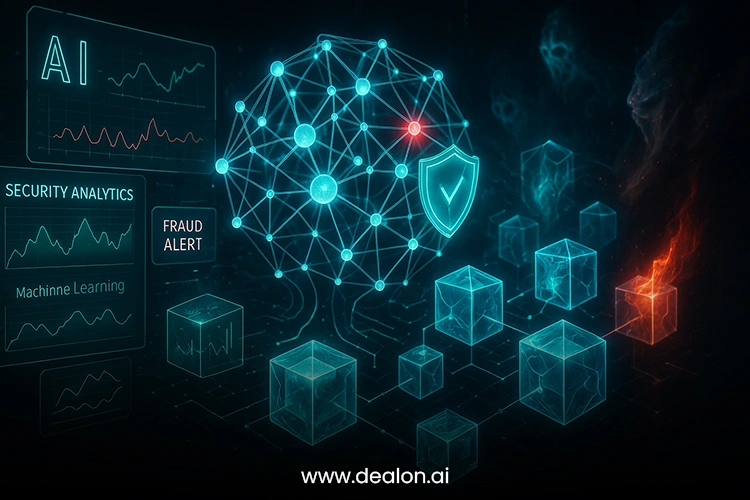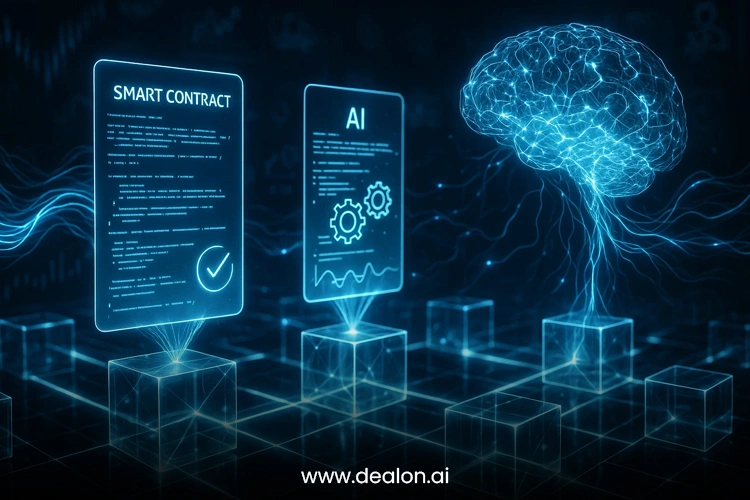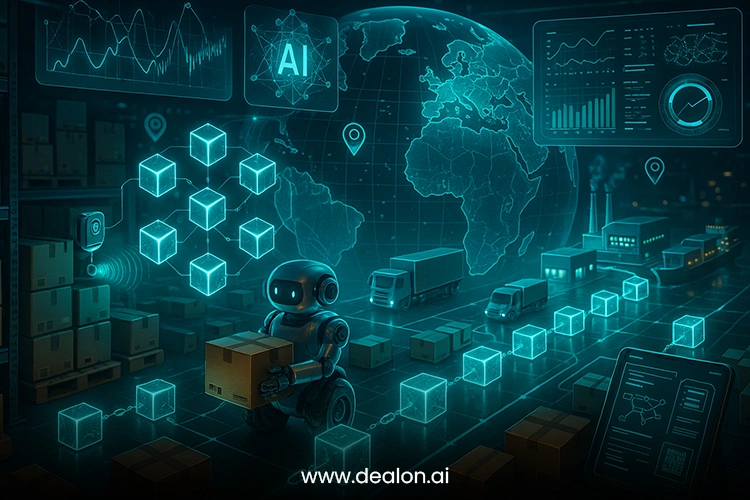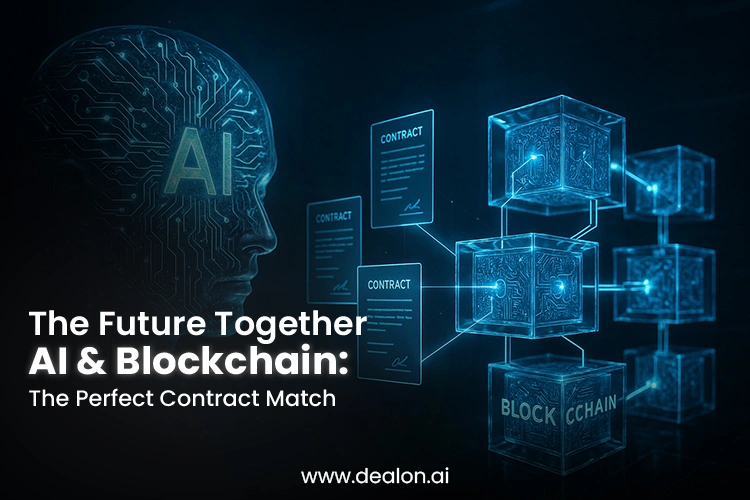The meeting of AI and Blockchain Technology is the most fascinating combination in the digital world today. Both of these inventions can revolutionize industries and make things more efficient and safer on their own, with a significant effect. The capabilities and use cases of AI and Blockchain, which are highly debatable, are the best pair to complement each other that have emerged these days. AI puts forth a massive amount of data in the world, and blockchain is the solution to it all. The combination of AI and blockchain can tackle high-impact problems within almost all sectors, such as finance, healthcare, logistics, and cybersecurity.
The uniqueness of blockchain technology lies in its capability of recording data in an unalterable manner. But its power can be massively enhanced with AI. AI can improve the potential of blockchain through process optimization, anomaly detection, and real-time decision-making. For instance, AI can help in automating a lot of work, such as brilliant contract execution or fraud detection, which would only serve to improve the efficiency of Blockchain networks. On the other hand, blockchain ensures that the data AI is building on is secure, transparent, and immutable.
These technologies can usher in a new age of intelligent automation. This refers to the use of secure data to learn and improve performance on decentralized networks. The possibilities are endless, from enhanced security and automated contracts to better supply chain transparency and enhanced financial transactions. The continued evolution of AI with Blockchain will generate increased opportunities, which will bring out a digital ecosystem that is secure and, at the same time, efficient, adaptable, and intelligent.
In this blog post, we’ll discuss how AI and Blockchain are revolutionizing industries with innovative applications. Further, we will see how these technologies are going to change the future of business and technology.
Also Read: The Rise of Green AI: How to Build Sustainable Machine Learning Data Models
AI-Enhanced Blockchain Security As a Powerful Combination

As the popularity of blockchain technology is on the increase across industries, security needs are at an all-time high. Blockchain maintains security due to its decentralized and immutable nature. Its essential characteristics include data integrity and transaction transparency. But as blockchain networks scale and become sophisticated, numerous security issues come into play, and it is here that AI can really make a difference. By enhancing the security capabilities of blockchain, AI could provide a powerful combination that protects decentralized systems from emerging threats and optimizes the performance of networks in unprecedented ways.
Detection and prevention of fraud and malicious attacks are among the notable applications of AI and blockchain matchmaking. Blockchain transactions are safe but not safe from sophisticated cyber-attacks like a Sybil attack (where a hacker uses multiple network identities) and a 51 percent attack. Malicious actors with a majority control of the blockchain network can perform such activities. The more complex a blockchain network, the easier it presumably becomes for a hacker to abuse an exploit.
AI can ensure the security of blockchain networks by monitoring transactions and user activity. AI may track blockchain transactions in real-time through the use of machine learning algorithms. They analyze a large amount of data for any unusual behavior that may signal a risk or security threat. These AI systems learn patterns to identify activities that diverge from what is considered normal in transactions. Human security experts would not be able to do this manually. For instance, an AI algorithm may flag an unusual increase in transaction volume from a single address or notice that a cluster of transactions seems to be emanating from geographically separate nodes, both signs of a potential attack.
Using AI for real-time anomaly detection allows blockchain networks to get an early-warning system that can avert threats before they escalate. In the case of a 51 attack, AI could catch wind of suspicious activity if it sees that consensus mechanisms, in no time, alert it of possible attempts to manipulate. Likewise, AI systems can identify patterns that show double-spending activities to always keep the integrity of the network intact.
In addition, the scalability and adaptability of AI are of great importance in enhancing the security of blockchain. As blockchain technology grows, its protocols and consensus mechanisms become more complex, requiring continuous tuning to new conditions on the network. The protocols optimized must be implemented in real-time security measures to mitigate the onslaught of threats against blockchain. For example, network bottlenecks can be resolved with the help of AI. This is done by checking transaction data. Additionally, it can suggest adjustments for the distribution of resources so that blockchain networks remain stable during overloads.
Many blockchain systems face a dual challenge of high energy consumption and slow transaction speeds of consensus mechanisms such as proof-of-work. Tools driven by AI can assess the performance of the entire blockchain network. They can also suggest enhancements such as modifying transaction fees based on demand or more energy-efficient consensus algorithms. These optimizations improve blockchain networks’ performance and help minimize the eco-footprint of blockchain-related activities.
In addition, AI can aid in enhancing the privacy and confidentiality of blockchain transactions. All transaction data becomes transparent with blockchain public papers. This means that they all can see the transaction data. Important sensitive information, like transaction amount and transaction parties, is visible to all.
While zero-knowledge proofs (ZKPs) certainly help improve privacy, AI could further enhance privacy by analyzing user behavior and making real-time adjustments to prevent the leaking of sensitive information. With the help of AI algorithms, the blockchain platforms can dynamically utilize cryptography. Thus, personal information is protected, but this does not affect transparency and immutability.
Finally, AI can also help blockchain to enhance its security. Artificial intelligence can check for any deletions and other discrepancies in the voting process on open decentralized autonomous organizations (DAOs). AI can recognize voting patterns. It helps in governing decisions with respect to the set framework and objectives. Also, ensures that malicious interference or corruption does not take place. AI helps blockchain governance actions become safe and transparent. It enables dApps to become more secure.
AI-Powered Smart Contracts: Automating and Optimizing Blockchain Applications

The utilization of smart contracts on various blockchain platforms has drastically modified many industries. Smart contracts encode the terms of a contract into lines of code that self-execute when certain conditions are met. All of this makes for cheaper, faster, and smoother transactions. Ethereum relies on smart contracts, which are programs that run automatically according to preset rules and require no central authority. However, with the growth of blockchain networks and emerging industries, there is a requirement for smart contracts to be more adaptable, innovative, and dynamic.
This is where AI comes in to complement smart contracts and take them further. AI and blockchain are complementary technologies. Blockchain provides security and transparency that will allow contracts to be executed without needing a third party. Further, AI will be able to add flexibility and the ability to learn from contracts. Together, they will allow contracts to change to suit new conditions.
AI, through machine learning algorithms, analyzes large volumes of data input. With that, real events can trigger smart contracts that automatically adjust the terms as per the input. These revisions can involve changing the financial conditions in a particular situation due to changes in the market. This may include changing inventory requirement clauses in a supply chain contract when stock levels dip. It may even include changing the delivery schedule due to unforeseen delays.
In a supply chain case, for instance, AI-embedded smart contracts constantly monitor the market, stock levels, and kick in when the environment is different from the contract specifications. If the need for a product suddenly spikes, the AI can invoke a clause that increases the price or a reorder of a product to guarantee timely delivery without a human.
With smart contracts on a blockchain, the contract will automatically execute when all conditions are met. When everything is automated, human error that comes with risks can be reduced while increasing efficiency. Combining smart contracts with AI could create a new way to live without fear. In finance, AI-enhanced smart contracts may execute complex trades and adjust investment portfolios based on changes in the market or the preferences of investors.
In healthcare, AI-enabled smart contracts can ensure that only one payment is made for medical services. They will activate if the patient is treated successfully and is satisfied with the services or facility. By tapping the potential of artificial intelligence with smart contracts, which encourage better and more efficient responses to market demands for delivery, logistics companies can reduce costs and improve the consumer experience with these far more transparent delivery systems.
Using AI in smart contracts allows businesses to analyze and process real-time data. In addition, this will enable them to predict future trends, which is not possible with conventional agreements. This combination lets contracts change over time, using new data, adapting their terms over time too. This means AI can monitor these smart contracts and enforce them for optimised execution. For instance, AI could highlight any faults, propose some suggestions, or discuss how the contract’s terms can be altered for better results in the future.
AI and Blockchain in Supply Chain Management: Improving Transparency and Efficiency

Blockchain is slowly being applied to supply chain management for better transparency and traceability. The blockchain’s ability to record every step of a product’s journey ensures that the data will never be tampered with at any step of the way. This creates a trusted and transparent record of where things originated and where they went. Businesses can streamline operations and reduce fraud. Consumers get more visibility regarding the provenance of the product that they wish to buy.
Linking AI with blockchain technology elevates supply chain management to an unprecedented level of sophistication and capability. Blockchain can offer an excellent mechanism to record every transaction securely. AI, however, can leverage the big data collected through blockchain to gather improved insights on the supply chain.
Artificial intelligence can, for instance, foresee major disruptions by analysing data on stock levels, production rates, transportation schedules, and sales trends. When it learns that an inventory supply shortage is on the horizon, or weather conditions may bring about a delay, AI can automatically take action through rerouted shipments or an altered order supply to prevent stockouts.
Additionally, AI can help improve logistics and inventory control with the help of supply-chain data. Companies can employ machine learning models to anticipate spikes in demand. These predictions help companies adjust the inventory based on forecasts so that waste is minimized. Artificial intelligence predictive analytics can help to predict the future trends of the supply chain. It assists the enterprises in planning. Companies may improve overall operational efficiencies by utilising AI-enabled analysis of blockchain data to achieve better inventory management, logistics, and procurement at lower costs.
The use of AI and blockchain in supply chain management also improves customer trust in a greater way. Firms can use the AI value chain to ensure products are quality, regulatory, and ethically sourced and compliant. AIs evaluate quality control data and mark products that do not meet particular standards, ensuring that consumers only receive products that are of the best quality. Blockchain technology allows customers to transparently track products in real-time, from the usage of raw materials to final delivery. More and more customers are seeking this type of information about the products they are buying.
AI technology can also automate numerous manual processes, such as sorting, packing, and quality assurance, that are part of the norm. When defects occur in a product, the product may be broken. However, the AI robots and sensors detect such defects. In addition, the robots sort out the products on the basis of various criteria. Ultimately, warehouse operations get optimized whilst speeding up the fulfillment process. As it saves time and labor costs, the chances of human error are also reduced with automation. This provides a higher level of consistency in supply chain activities.
The Future of AI and Blockchain: A New Era of Innovation
The collaboration of Blockchain Technology and Artificial Intelligence (AI), even though relatively new, has unlimited possibilities. With the continued advancement of both technologies, together their powers will change industries and create new opportunities for innovation, efficiency, and security. The ability of blockchain to provide security, transparency, verification, and a global decentralised ecosystem, combined with AI’s ability to learn, adapt, and optimise in real time, would allow for the era of autonomous business processes. The digital ecosystem will be enhanced in security, efficacy, and transparency.
In the coming years, we will see the development of systems that will be autonomous and have very little human involvement. These systems will securely work with the use of AI and Blockchain technology. In the field of finance, artificial intelligence could make complex investment strategies with smart contracts, which can also adjust the portfolios in real time based on the market and blockchain.
In the healthcare sector, when it comes to personalized treatment plans, AI could dynamically optimize them, whereas blockchain could ensure that the patient data is stored and shared across multiple providers in a secure manner. Just like that, similarly, in logistics, the AI-powered systems can optimize the supply chain by analyzing real-time data. With the help of blockchain, one can track every product’s journey, which ensures transparency and accountability.
As companies and industries are exploring the vast possibilities of AI and Blockchain, at the same time, their marriage will disrupt and redesign industries. The technologies will build intelligent ecosystems that sustain themselves. They will revolutionise industries through trust, efficiency, and real-time decision-making on a large scale. The future of tech lies with AI and Blockchain. Together, these are going to showcase unimaginable possibilities. Innovation will transform the methods we communicate in the digital atmosphere and will steer our industries in the direction of a bright future.
Conclusion
The arrival of AI and Blockchain is bound to give industries a new beginning with varied benefits, given their abilities. Through Learning, Adapting, and optimizing, along with the security and transparency of blockchain, businesses will create innovative and decentralized systems to increase efficiency, security, and automation of public services. There are great possibilities in finance, health supplies, and supply chain management. And as technology continuously evolves, they will start to grow bigger as well. The combination of AI and Blockchain will change how we work today in a brighter, more efficient, and secure manner.

